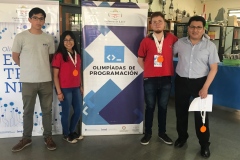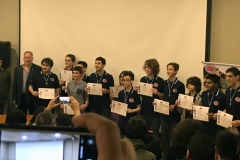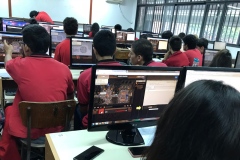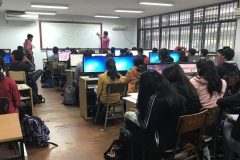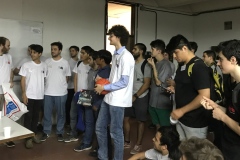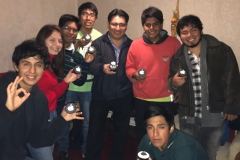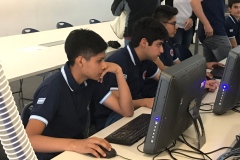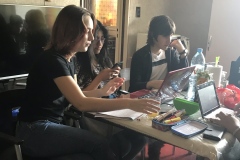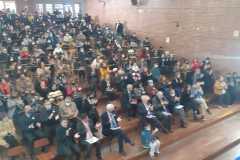Foundation for the Development of Computer Science Education in Jujuy (DIJ)

“Cálculos ancestrales” de Adrián Silisque y Open AI (2023)
"We work to improve the present and future of computer science students in Jujuy."
Foundation for the Development of Computer Science Education in Jujuy (DIJ). Foundation "Friends of DIJ' of Los Angeles, California.
"From Jujuy to the world..."
Jujuy is a very small province located in the Northwest of Argentina, up in the Andes Mountains abutting Bolivia and Chile. Jujuy has a strong native population -- direct descendants of the Incas, who created an amazing civilization before the Spaniards arrived. They are about to create a new revolution! We believe that the future of Jujuy, and indeed the future of Argentina, is intertwined with the entire economic future of the world. In this new era, progress lies not in natural resources, commodities, or even agricultural or industrial productivity, but in the very brains of its citizens, who may now, because of the internet, sell its talent across physical and psychological borders to the entire world. This is what this fascinating project is about.
Jujuy has already proven, and continues to prove daily, its leadership in software development in northwest Argentina, thanks to its extraordinary and totally free educational resources. Jujeño leaders in the field include the National University of Jujuy (UNJU) and the renowned public high school, the "Dr. Horacio Carrillo School of Mines," which is generating a group of brilliant software engineers. Our foundation is dedicated to fostering this development by initially supporting high school and engineering students facing financial hardships that extend beyond their educational needs, including basic necessities such as food. It is disheartening to note that some engineering students have experienced extreme hunger on campus—actually fainting on campus—highlighting their unwavering determination and passion for their studies. Thus, our support goes beyond enabling them to dedicate time to programming; it also helps them with basic necessities of life, like food and transportation from their remote towns to the educational centers in San Salvador de Jujuy and other major cities nearby.
We also focus on younger students in primary schools scattered throughout the province --even in remote and isolated places in the high-altitude Andes Mountains -- to instill knowledge and a love for this wonderful, rewarding, and revolutionary field of work. Our foundation also financially supports computer science teachers, both at the secondary and university levels. Due to the lack of public funds, many of these teachers must at times spend their own money to assist their brilliant students. Our foundation aims to replace these personal contributions with generous private philanthropy to ensure greater access to resources and to ensure that teachers do not feel pressured to spend their very modest salaries on school resources. Finally, we provide financial assistance to educational institutions like UNJU and the School of Mines, which require excellent equipment to carry out their educational goals.
Our mission includes granting scholarships to deserving students, such as the ones who participate in national and international informatics competitions. Jujuy has already included students as part of the Argentine team at the International Olympiad in Informatics competitions. We provide financial support to Jujuy's computer science teachers, allowing them to travel to educational centers to improve their knowledge. We engage private IT companies at the national level, especially those working on original projects, to offer jobs and internships to this center of young local talent, which is already a shining example for the other northern provinces of our country.
Finally, our mission includes educating the inhabitants of the wonderful province of Jujuy about the importance of this new form of education and future work for their children. Today’s global economy enables remote work, which transcends not only Jujuy's borders but also Argentina's, providing top income and preventing brain drain due to lack of local employment opportunities. We know that Argentine programmers, especially the indigenous people or communities living in Jujuy, possess the intelligence, drive and creativity to engage in the various activities within the global IT field without having to leave their hometowns and migrate to more prosperous regions. This type of work applies not only to traditional desktop software development but also to video game engineering morphing into Metaverse, graphic design, network administration, remote medicine, accounting and other services that can be performed virtually on a global scale from Jujuy. The creation of exciting new computer programs and mobile applications with the potential to change the global economy is not and should not be exclusive to major global IT hubs. We are at the vanguard of a more democratic world where brilliance knows no geographical boundaries, flourishing particularly in societies teeming with exceptional talent, as exemplified by the people of Jujuy. Their potential, hindered solely by insufficient financial resources, limited public funding, and cultural burdens, is a testament to the untapped wealth of human potential worldwide. This, in turn, generates more educated, healthier, and freer global citizens who then can purchase goods and services that the first-world has to offer, thus improving the economy throughout our world. The goal, thus, is for more young people in Jujuy to wish to learn and remain in their region so as to significantly improve the economy, not only of Jujuy, but also of Argentina and Latin America in general. We strongly believe that this is a wonderful way to harness the wealth of the people in the developing nations and take them out of poverty. The human brain is the new tool for prosperity. For we are confident that if this project is successful in Jujuy, many other rural provinces throughout Latin America, indeed the world, will follow suit, replacing their erstwhile poverty with an explosion of technology experts, startups, and highly educated, eager individuals excited about giving back to their compatriots across the region.
An example of Greatness.

Adrian Silisque, from Humahuaca, Jujuy: An expert in Artificial Intelligence software engineering, he is also an accomplished film-maker and novelist. His Trilogy: Inkakuna, a story of Atahuapa, the last Inca, and the Conquistador Francisco Pizarro as related by the wife of Atahualpa, is a masterpiece in history and imagination. Adrian graduated from the Public University of Jujuy with the highest honors, and received a scholarship to study Artificial Intellience at the renowned International Center for Numerical Methods in Engineering (CIMNE) of Barcelona, Spain. Adrian is co-founder and President of this Foundation. As he often says: “A single swallow does not spring make.”
A single swallow does not spring make.
Here is his story:
"There are stories that deserve to be told and repeated hundreds of times. There are stories that make us believe that another reality for the world is possible. And perhaps one of those stories is my personal journey. I was born in the Quebrada de Humahuaca (Northwest Argentina) and spent the early years of my childhood in a small town with just 200 inhabitants (Iturbe). Surely, my family had limited economic resources, like most people in the Quebrada, but the greatest gift they could have given me was the habit of studying and a love for self-improvement.
Years later, after completing high school, my parents did everything they could to send me to study in San Salvador de Jujuy (the capital of the province of Jujuy), where I began my Computer Engineering degree at UNJU (National University of Jujuy). Without a computer or internet access, I learned to program with pen and paper until, thanks to my parents' tremendous effort once again, they were able to acquire a PC. I felt so grateful that I completed the engineering program in the five years it was supposed to take, which is not very common in university history. Not only that, but I also achieved the highest GPA in all programs not only of the School of Engineering, but also the highest GPA across the entire National University of Jujuy. This earned me two gold medals, one from UNJU and the other from the Jujuy College of Engineers.
I was awarded a scholarship from the International Center for Numerical Methods in Engineering (CIMNE) in Barcelona, Spain, where I pursued my studies in Artificial Intelligence. Due to my restless spirit, I also decided to immerse myself in the artistic field, eventually obtaining a Master's degree in Film Direction and Production from the Polytechnic University of Catalonia. Since then, I have written several books and won numerous awards, some of international acclaim.
You may wonder why I'm telling you this story. Because it's the story of a swallow that, with limited resources, was able to change the course of its life. However, as the saying goes, "One swallow does not summer make." And this is the dream we share at the DIJ Foundation: to create a technological springtime in Jujuythat may then be copied across the world. Yes, a Mini-Silicon Valley way up in the Andes. We dream and we work to see Jujuy positioned as an international leader in software development. All one needs today to be able to change the world is brains and education.
We know it's possible, and we will achieve it with your help".
After living in Europe for 20 years, our president now resides not in Europe, not even in Buenos Aires or San Salvador (the capital of Jujuy), but in the small town of Humahuaca, where he returned to live with his family. Indeed, Adrián works in Europe, but without moving from his hometown of Humahuaca. This is the new paradigm we aim to develop, which will transform towns across the developing world, . We will turn this swallow into spring-springtime for the entire world.
Foundation “Friends of DIJ”
The Foundation for the Advancement of Computer Science Education in Jujuy (DIJ, which stands for “Desarrollo informático jujeño”) was established in Jujuy, Argentina, last year as a non-profit organization with the aim of fostering educational growth in the field of computer science and technology. In parallel, its sister foundation, “Friends of DIJ,” was founded this year in Los Angeles, California, as a non-profit entity, enabling U.S. donors to engage with and support this initiative while potentially benefiting from applicable U.S. tax incentives. These two foundations share an identical mission and maintain a close collaborative relationship, working in tandem to achieve their common goals.

December 5, 2006
La NACION
A Burgeoning Software Hub Emerging in Jujuy
This 2006 article, taken from the Buenos Aires newspaper "La Nación," was the initial spark that ignited our interest in the remarkable transformation unfolding up in the Andes mountains. The School of Engineering at the UNJU which was originally established to instruct mining-related subjects, underwent a remarkable reinvention in the late '90s, shifting its focus towards software development. A decade later, this unconventional approach to education in that underedeveloped region was beginning to yield amazing results. The internet played a pivotal role in making a groundbreaking form of work not only viable but also profitable.
https://www.lanacion.com.ar/ciencia/crece-en-jujuy-un-nuevo-polo-de-software-nid864831/

The first entrepreneurs from 2006 in front of the Seven Colors Hill (Cerro de Siete Colores) in Jujuy. From left to right:
Professor Jorge Mendoza (UNJU, Bintelligence), Juan Carlos Rodriguez (CTO Umana), Professor Marcelo Gonzalez (UNJU, Tecsol), Elvio Velasquez (CEO-DevelarGroup), Marcelo Vasquez (CEO Blimox), Professor Jorge Griot (Vice-Rector UNJU), Pablo Gudiño (CEO, Openix).

Facultad de Ingeniería – UNJU
Historias
Videos de la Fundación DIJ
Campañas

¡La Universidad de Yale se ha unido a nuestro proyecto!
El miércoles 20 de diciembre a las 20:00 horas (ART), hemos programado un seminario web desde la Universidad de Yale en los Estados Unidos para evaluar el proyecto DIJ. La propuesta es que varios distinguidos exalumnos nos visiten para brindar su apoyo.

